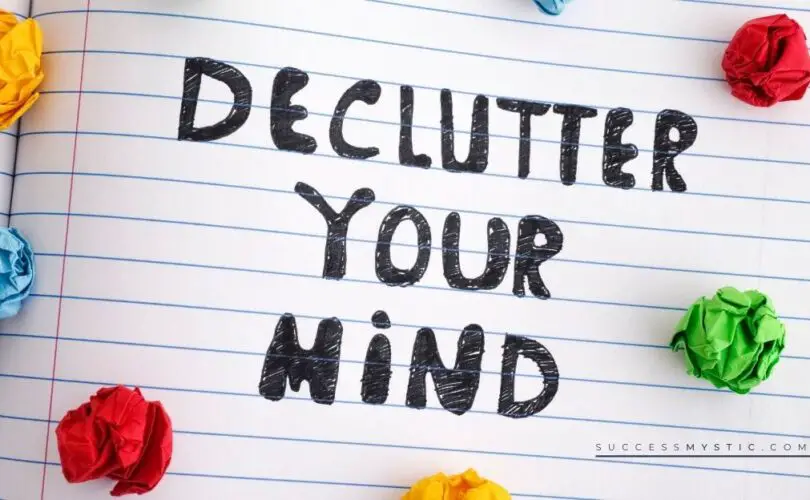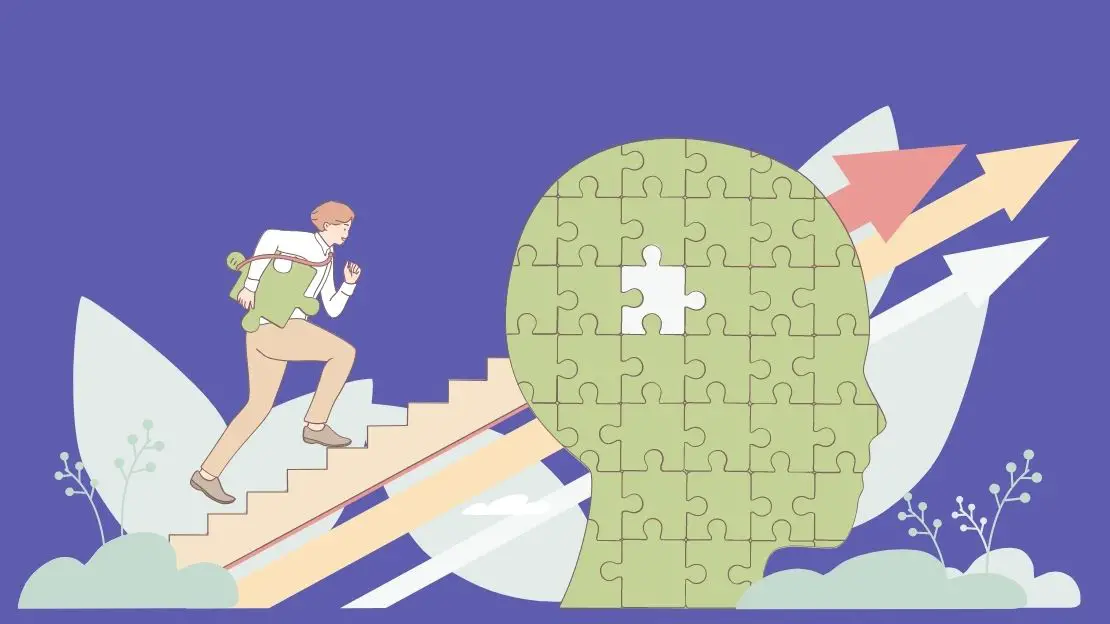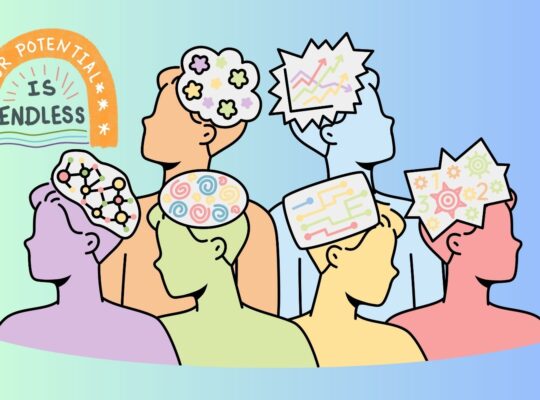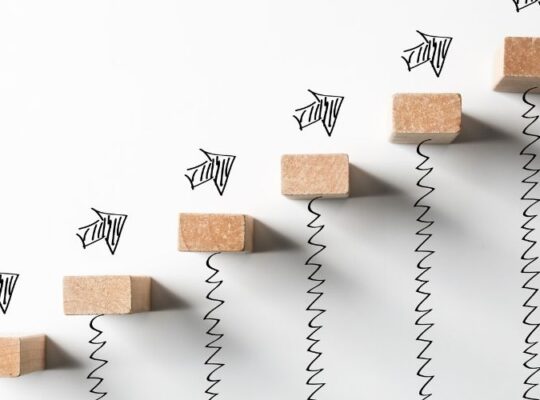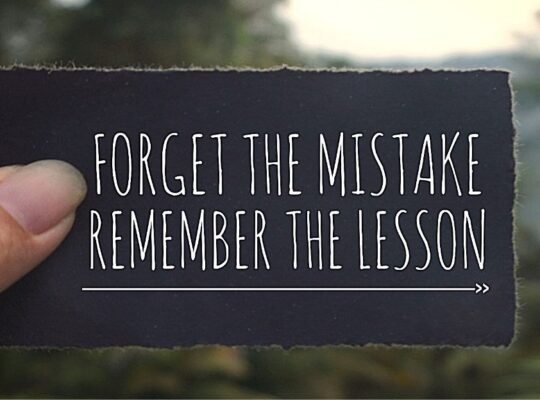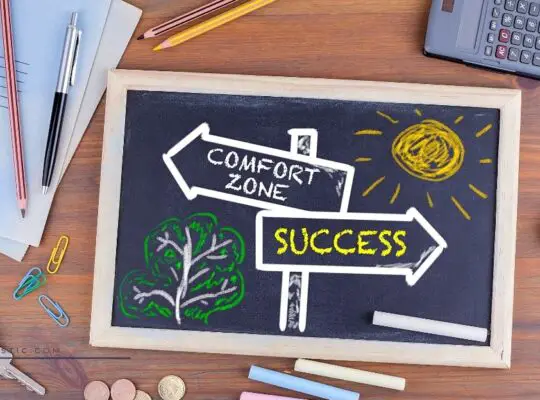Declutter Your Mind To Gain Focus, Improve Concentration, Lower Stress Levels and Boost your Productivity and Performance
According to the experts, we race through something like 60,000 thoughts every day. So, to say our minds are full of clutter is an understatement. Sadly, many of the thoughts that we have are the same ones, and we think them over and over, constantly beating ourselves up about that party where we made a social misstep fourteen years ago. Or, perhaps your thoughts are in the present – you don’t have enough money, your house is too small, if you just had more x then you’d be happy. We all have our own problematic thoughts battling with the rest of our 60,000 thoughts.
The problem with that is that you’re just rehashing those same thoughts and stuck on the negative. A cluttered mind causes you worry, and the worst part of that worry is that it’s wasting your time and draining your mental energy. In order to manage this situation, you need to declutter your mind to build mental muscles with good habits that will stand you in good stead.
Sometimes it seems as though the harder we seek a peaceful mind the more difficult it is to find it. Essentially, our minds are being attacked by chaos and clutter. It’s easy to despair, but much like you can declutter your car, desk, and home, you can also declutter your mind. Be honest, doesn’t your mind deserve it?
You can’t file thoughts away or leave them aside when they don’t interest you. Unfortunately, it’s not an email system that lets you easily organize it.
The brain is a supercomputer, it’s complex and it is really our core. Just think about what you’ve been through in life and imagine clutter as scar tissue. No wonder you’re struggling.
The Decluttering Porcess
The process doesn’t have to be a difficult one. The entire idea behind decluttering is that it’s simple. So, we are going to discuss the simple actions that you can take to make a difference immediately and going forward. A cluttered mind is unfocused and it’s restless, it wants to go in all the wrong directions and all at once.
So, you end up with very little getting accomplished. What does mental clutter look like? It could be worries about your future, dwelling on mistakes of your past, a never-ending mental to-do list, wrongs against you, complaints about life, and the beat goes on. The strategies that we will discuss here are all aimed at helping you purge those issues to find clarity and peace of mind.
1| Problem Indentification
It’s difficult to fix something when you have no idea what’s wrong. Therefore, it’s vital that you recognize the warning signs of an overcrowded mind. Some of the most common signs include difficulty sleeping, an inability to relax, as well as poor focus and concentration.
When you recognize there are issues you face, you have to determine what is simply adding to your cluttered mind. You should reflect on exactly how you feel in order to define what’s causing you stress and why. In time, you will learn to spot those warning signs as soon as they appear and deal with them quickly.
2| Mindfulness
You have likely heard that meditation is a great way to relax and to clear your mind. What you may not know, though, is that there are a multitude of ways for you to be mindful. There is no one right way to do it and you can find one that works best for you. Deep breathing, body scans, yoga, and exercise are all methods of mindfulness that you can use.
There’s good news for people who aren’t necessarily comfortable with those methods of mindfulness. Other ways you can exercise a bit of mindfulness are spending time in nature, indulging in a bubble bath, and even spending quality time with your pet. If it works for you, it works.
3| Prioritize
Goals are great, but you need to set priorities. This is one of the most effective ways to proactively tackle your life. So, how do you do that? First, you need to figure out what really matters to you – what are your long-term goals and what are your aspirations for life? Make a list of what you would describe as your ultimate priorities.
Now, you can create an action plan and determine exactly what actions you will take and decisions that you will make to ensure you live them. When you make an action plan, you need to consider exactly how you will divide your time and how much focus each thing on your list will receive.
As you grow older, you will likely see your priorities change. After big life events, too. So, it’s okay to revisit your priorities and change things as needed.
4| Journal
Let it all pour out. Keeping a journal is an excellent way to let your mind relax because it’s an opportunity to organize and analyze your thoughts. Writing is a great way to deal with intrusive thoughts.
According to the American Psychological Association, writing improves working memory as well as eliminating your intrusive thoughts surrounding negative situations and events (*).
The key here is that these changes free up space in your mind for other activities, such as stress management. A daily journal will also help you cope with depression, manage anxiety, and provides you with a healthy way to release the emotions that you have been bottled up. If you aren’t sure where to start – try bullet points.
5| A Mental Inventory
This is basically, your to-do list. So, transfer it from your mind and put it down on paper. This list should be organized in what you need to do, what you should do, and what you want to do. Why are you doing these things? You don’t have to think deeply on this, it’s just important that you’re mindful of why you do the things that you do. We are so guilty of taking on more responsibility than we need to and being distracted by what we should or could be doing, instead of asking ourselves if we want to do any of this.
So, with everything on your list, ask yourself is it vital and ask yourself if it matters to you (or someone you love). If you can’t say yes to that, then there’s a good chance it’s a distraction so, cross it off your list and forget about it. The more you cross off, the less distracted you are and the less cluttered your mind will be.
Now, take a look at what’s left of your list. It will be filled with important and/or necessary tasks. If there are projects, break them down into smaller pieces. Small projects need defined tasks and actions to drive you and they should be completed in a timely manner.
Revisit your inventory on a daily basis, there will be things to cross off and tasks to revise. You don’t have to spend hours with it, it only takes a few minutes. You don’t want to head off course with your inventory and it’s easy to drift. Remember, when it comes to renewable resources, time is not one of those, so you need to use yours wisely.
6| Letting Go
Those negative thoughts that you’ve been holding onto, you have got to let them go. Fears, worries, negative thoughts, all of that is dragging you down and if you let it go, you’ll experience a boost in your self-esteem and plenty of mental space.
7| No Multi-Tasking
Despite what people tell you, no one is an effective multi-tasker. Okay, there are probably some people who can do it properly, but the average person is not gifted with this skill. You can’t put together a presentation for work, while also shopping and updating social media.
You just can’t. You may juggle tasks briefly from time to time, but you can’t make a habit of attempting to multi-task.
All it does is creates more clutter for your mind, steals your attention span, and increases your stress levels. Your brain has to work harder to filter irrelevant information. A Stanford University study found that multitasking can not only impair your cognitive function but also impacts your efficiency (*).
Focus on single tasks, and the best way to do that is to create a list of what you need to do each day and prioritize it. Tick each item off as you go.
8| Breathe
Inhale deeply, draw a deep breath from your diaphragm and take a pause before you exhale slowly. Repeat this process. You probably feel better already. It’s a simple exercise, but effective for clearing your mind and boosting your mood.
It lowers your blood pressure and heart rate, and because it stimulates the nervous system it provides your body with immediate relaxation. It’s a stress reliever, and more importantly, it can help you clear your mind and boost your concentration.
9| Declutter Your Environment
What does your workspace look like? If it’s cluttered, then you are probably easily frustrated at work and perform less efficiently than you should and could be. So, take a look at the area where you do your work and get rid of everything that is non-essential. Find a home for every item and keep it there when it’s not in use.
Don’t stop in your workspace, continue the decluttering of your physical environment at home. Clutter just creates mental clutter because it bombards your mind with unnecessary stimuli.
The physical sight of clutter also tells your brain that there is something to do, which can be exhausting for your mental state. So, as you declutter your vehicle, your bedroom and the rest of your home, you will start to notice that it’s decluttering your mind as well.
10| Decisiveness
You can think of clutter in another way. A delayed decision. When you avoid the decision- making process, you allow your brain to be overwhelmed by the clutter related to those decisions. So, stop it! Make the decision. Weigh up the pros, consider the cons, and make your decision. Once you do, don’t look back.
11| Thought Sharing
Speak to someone close to you and just let it all out. Sometimes you can reach a bit more clarity when you get everything off your chest. It also gives you a new perspective on a situation, which can help make better decisions and think a bit more clearly.
12| Limit News
We all know how easy it is to hop online to check the news and get sucked into a rabbit hole of articles. Or, to start scrolling your social media accounts only to resurface an hour later in a daze, having learned nothing.
What you consume impacts your mental health. If you spend hours of your day indulging viral videos and reading articles that make you angry, you’re clogging your brain with unnecessary information. That’s causing you anxiety and stress. So, try to limit the information that you consume.
The first way you can do that is limit how much time you spend on social media. The next step is to prune whom you follow and interact with on social media. Don’t pay attention to all of the negative content and choose media outlets that are known to be reliable.
13| Unwind
You deserve a break. Your brain needs time to recharge, it needs to reset. Part of that happens when you sleep, but so many of us get terrible sleep that it’s not enough. Turn off your phone, step away from the television and the computer, and go out and do something you love to do. It might be a game of basketball or perhaps a hike.
14| Write it Out
This doesn’t need to be the same as keeping a journal but writing it all out is a great tool to free your mind from everything you’ve been keeping up there. You can use an app, a pad of paper or an online tool to do it. Just, write it all out, let it pour freely. You don’t need to read it back. You don’t even need to keep it, if you write it out on paper you may get great joy from ripping it up and throwing it in the trash.
15| Auto Pilot
Even routine tasks can take up a lot of space in your brain, that means your thoughts on what to eat for breakfast, what you plan to wear, where to go for lunch, what to have for dinner, and so on.
You can take the work out of routine tasks by cruising on autopilot. So, plan your outfits in advance, have your breakfast, lunch, and dinner planned. There is a benefit to routine, and for mundane tasks and habits, you should let autopilot take over.
16| Sleep
Speaking of sleep, there’s a good chance that you aren’t getting enough of it. Adults need at least seven hours of sleep of sound sleep. How much do you get? A good night’s sleep can do wonders for your brain and a healthy routine before bed can help you make sure you get it.
Consider keeping gadgets out of the bedroom, turn screens off at least an hour before bed. Everything you do in the run-up to bedtime should be about unwinding and getting your body ready for sleep.
17| No Pity Parties
It’s normal to experience disappointment and feel sad. It’s healthy. Self-pity is not healthy. This is when you magnify the negatives in your life, the misfortune that you have experienced, and convince yourself that no one else’s problems are anywhere near as bad as your own.
They can leave you feeling stuck. When you find yourself in the midst of a pity party of one, take positive action. You might not be able to solve the problem that you face, but you can choose to do something positive in the face of it.
Keep your eyes and ears open for language that you use that paints you as the victim. When you say it’s always me, no one gets it, it’s a sign that you are working against yourself and filling your head with nonsense.
18| Challenge Self-Doubt
It’s rooted deeply, and it’s difficult to overcome it when you simply respond with superficial platitudes because it’s obvious that you don’t believe them. Telling yourself constantly that you’re awesome might not be enough to drown out all of the negativity.
The best way to challenge self-doubt is to challenge the negative thinking that’s fueling it. You have to prove to your brain that you are competent and capable, and you can do that by challenging self-doubt.
19| Problem Solving
You’re dealing with a difficult co-worker, you have a hard time paying bills, it doesn’t seem like there’s much to help in these types of situations. However, problem-solving is helpful. When you second guess your decisions or imagine the worst-case scenario, you aren’t moving forward.
If it’s an unsolvable problem, change your environment. If it’s a fixable problem, but you don’t have a solution, then change your mindset. Give yourself 20 minutes each day to let yourself worry and push it aside once you’re done.
20| Mental Muscles
If it weighs you down, let it go. Good habits are more effective when you don’t engage in the bad habits that counteract that hard work. Decluttering your mind will allow you more energy and time to dedicate to the productive and positive things in life, which will help you build your mental muscles.
21| Take a Walk
There is no better way to declutter your mind than by going outside and doing something. A walk around the block is a great way to clear your mind. If that doesn’t float your boat, you can work in the garden, go running, hike or just go sit in the park and watch nature roll by.
Find out when the dog walkers hit the park and find yourself a bench after your walk to enjoy the pups playing, if you’re lucky you may even get some petting time, too. It really doesn’t matter what you do, getting outside and doing something active will help you clear your mind.
Of course, the added benefit of this is that you will spend less time in front of the television. You might think it’s relaxing, but really, you’re being overwhelmed with noise and there’s a good chance you enjoy programs that make you angry or stress you out.
22| Nature
Nature is another excellent way to declutter your mind. We mentioned physical activity, but just spending time in front of a lake, ocean or the river can be calming. For you, it could be a body of water or maybe it’s the mountains. It doesn’t really matter, it’s just that you’re doing something that takes you away from activity and helps you commune with nature.
23| Do Less & Go Slow
Don’t overwhelm your to-do list, focus on just a few things and get them out of the way right away. The next piece of advice may surprise you but go slower. You only get to live life once, and fast forwarding through it all is making you miss out. It’s also overwhelming. So, why don’t you take your time and enjoy the scenery?
24| Don’t Overbook
The society that we live in is seriously fast-paced and we are being completely dominated by impossible to-do lists, a long list of social obligations, and just trying to live. It’s common to forget that we are capable of and
allowed to say no.
Sometimes it’s important that you say no. Yet, instead, you are obliging any and every request and then suddenly, you realize you don’t have the physical time to do even half of it. You go ahead and try anyway.
Suddenly you are overwhelmed and burnt out. If you often experience anxiety in anticipation of everything, then you need to stop overbooking yourself.
If you want to truly declutter your mind, you need to start doing less. Be realistic about what needs to do be done and what you’d like to do and make sure that there’s time for the latter.
25| Don’t Do It
Really, the final point builds on the previous point and some people will argue that this is controversial advice. The very idea that this is considered controversial should tell you everything you need to know about how our society pressures us into burnout. If your brain is constantly in overdrive, then this point is highly beneficial.
Sometimes, the greatest advice that you can take is to do nothing at all. Take a bath, chill out on the couch, relax in the backyard, stop for a nap, meditate or practice yoga.
Sometimes, the best way to be productive when your mind is cluttered is to forget about productivity. Take a morning, an afternoon or a whole day and make it low-impact. Kick back with a good book or just chill out.
Final Thoughts
Your mental clutter is congesting the world within you. It blocks your path to your inner voice and makes it fairly difficult to focus on what counts, and to think clearly. How can you make wise decisions when you have tens of thousands of thoughts whizzing around your brain?
How can you live your best life when your mind is so cluttered? All anyone really wants in life is to lead a happy life, one where we enjoy our friends and family, do a job we don’t hate, and live comfortably.
It’s incredibly difficult to do all of that when you are swimming in a cluttered mind. It’s like attempting to escape from quicksand. While the movies would have you believe that you will drown in quicksand, the truth is that when you’re in it until your chest you essentially float there.
That’s what a cluttered mind does to you – and while you might not literally drown, you are more vulnerable to many dangers. As you declutter your mind you will find yourself creating steps to help you walk up and out of that quicksand.
With the tips we have provided you above, we hope that you can embark on a journey to declutter your mind. As you embark on your journey, check in with yourself regularly.
Ask yourself whether what you’re doing is serving you. Is it aimed at helping you? Is it cluttering your mind? Check in to make sure you’re not wasting your time on things that don’t matter, things that don’t serve you or things that are adding clutter to your mind.
The most successful people remain focused on single goals and single tasks. They’re successful at pushing the clutter aside to rise above the noise, clear their head, and go after what they want to accomplish.
Successful people don’t let the noise or life overwhelm them. They don’t allow negative people to impact how they feel or think. They remain focused on the one thing, the main thing. What is your main thing? If you don’t know yet, then you might want to start right there.
All of the tips we have provided you with above will help you declutter your mind and keep you on the right track. Moreover, there’s good advice on how you can understand what you really want out of life and use the rest of the tips to help you achieve that.
It all starts with a choice – the choice that you made to read this, is your choice to declutter your mind and learn how to do better in your life and be your best self.

